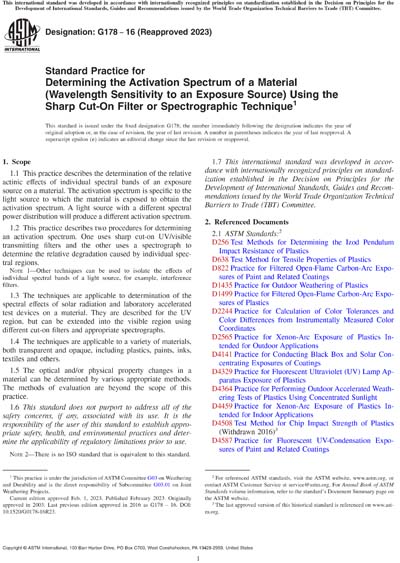Most recent
ASTM G178-16(2023)
Standard Practice for Determining the Activation Spectrum of a Material (Wavelength Sensitivity to an Exposure Source) Using the Sharp Cut-On Filter or Spectrographic Technique
1.1This practice describes the determination of the relative actinic effects of individual spectral bands of an exposure source on a material. The activation spectrum is specific to the light source to which the material is exposed to obtain the activation spectrum. A light source with a different spectral power distribution will produce a different activation spectrum.
1.2This practice describes two procedures for determining an activation spectrum. One uses sharp cut-on UV/visible transmitting filters and the other uses a spectrograph to determine the relative degradation caused by individual spectral regions.
Note 1:Other techniques can be used to isolate the effects of individual spectral bands of a light source, for example, interference filters.
1.3The techniques are applicable to determination of the spectral effects of solar radiation and laboratory accelerated test devices on a material. They are described for the UV region, but can be extended into the visible region using different cut-on filters and appropriate spectrographs.
1.4The techniques are applicable to a variety of materials, both transparent and opaque, including plastics, paints, inks, textiles and others.
1.5The optical and/or physical property changes in a material can be determined by various appropriate methods. The methods of evaluation are beyond the scope of this practice.
1.6This standard does not purport to address all of the safety concerns, if any, associated with its use. It is the responsibility of the user of this standard to establish appropriate safety, health, and environmental practices and determine the applicability of regulatory limitations prior to use.
Note 2:There is no ISO standard that is equivalent to this standard.
1.7This international standard was developed in accordance with internationally recognized principles on standardization established in the Decision on Principles for the Development of International Standards, Guides and Recommendations issued by the World Trade Organization Technical Barriers to Trade (TBT) Committee.
Content Provider
ASTM International [astm]






